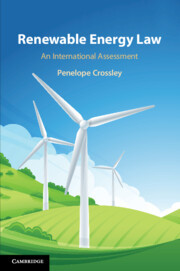Description
Renewable Energy Law
An International Assessment
Author: Crossley Penelope
Provides the first scholarly and comprehensive book on the national renewable energy laws of every country that has them (113 countries).
Language: English
Subject for Renewable Energy Law:
Approximative price 31.58 €
In Print (Delivery period: 14 days).
Add to cart
Renewable Energy Law
Publication date: 05-2022
Support: Print on demand
Publication date: 05-2022
Support: Print on demand
Approximative price 120.25 €
In Print (Delivery period: 14 days).
Add to cart
Renewable Energy Law
Publication date: 11-2019
298 p. · 23.5x15.5 cm · Hardback
Publication date: 11-2019
298 p. · 23.5x15.5 cm · Hardback
Description
/li>Contents
/li>Biography
/li>
With the rapid growth of the renewable energy sector, it has become increasingly important to understand how renewable energy is defined in national laws around the world and what regulatory mechanisms these countries are deploying to achieve their renewable energy goals. In Renewable Energy Law: An International Assessment, Penelope J. Crossley compares the national renewable energy laws for each of the 113 countries that have such a law, shedding light on the question of whether energy laws are converging globally to facilitate trade or engaging in regulatory competition. The book includes over sixty extracts from different national laws, case studies on the European Union and the Chinese wind sector, and many examples of the particular challenges facing specific countries. This work should be read by scholars, policymakers, regulators, employees of commercial entities operating in the energy sector, and anyone else interested in the legal and regulatory landscape of renewable energy.
1. Introduction; Part I. What is Renewable Energy? A Case of Conceptual Consensus: 2. The renewable energy sources used for electricity generation; Part II. Why Do Countries Intervene in the Renewable Energy Sector? A Case of Normative Divergence: 3. The economic justification for regulating renewable energy; 4. Why do countries legislate to accelerate the deployment of renewable energy?; Part III. What Role Do Regulatory Support Mechanisms Play in National Renewable Energy Laws? A Case of Substantive Divergence: 5. How do countries regulate to support renewable energy?; 6. The future development of regulatory support mechanisms – unification, harmonisation, convergence, divergence or regulatory competition?; 7. Conclusions and recommendations.
Penelope J. Crossley is a Director of the Australian Institute for Energy and a member of the Technical Working Group of the Energy Security Board. Prior to entering academia, Crossley practised as a Solicitor in London and Beijing specialising in Global Energy and Infrastructure Law.
© 2024 LAVOISIER S.A.S.

